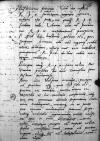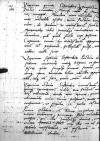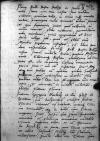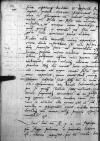Cum me infimum Reverendissimae Paternitatis Vestrae servitorem ingenue agnosco, indignum esse puto me quicquam Reverendissimae Paternitati Vestrae scribere velle. Verum, cum non parum me Reverendissimae Paternitati Vestrae certificaturum prospicio, si quid hic hactenus gestum est, perscripsero. Humani enim est ingenii rebus novis delectari, officii mei esse intellexi, quam primum Reverendissimam Paternitatem Vestram de his rebus certiorem redderem.
Principio itaque Reverendissimam Paternitatem Vestram scire velim nos Vienna (Wien, Vienna), city in eastern Austria, on the Danube river⌊ViennaVienna (Wien, Vienna), city in eastern Austria, on the Danube river⌋ profectos die divo Stanislao sacro Pest, city in Hungary, on the left bank of Danube river, which divides Pest from Buda, in 1873 Buda, Pest and Óbuda were unified to become Budapest⌊PestumPest, city in Hungary, on the left bank of Danube river, which divides Pest from Buda, in 1873 Buda, Pest and Óbuda were unified to become Budapest⌋ pervenisse. Porro cum Vác, town in northern Hungary on the eastern bank of the Danube river⌊VaczowVác, town in northern Hungary on the eastern bank of the Danube river⌋ essemus, pontem ad insulam usque, quae illic sita est, partim ex navibus, partim etiam ex nassadis, ut hic vocamus, confecimus atque cum iam onerarios currus imperatoris exercitus traducerent moramque in eo ponte prae curruum multitudine facerent imperatorque exercitus cognoscendae morae causa ex equo in eum descendisset, interim navis oneraria magno cum impetu, veluti futuri cuiusdam mali omen, ad pontem impegit eumque non modo labefactavit, verum etiam rupit.
 BCz, 247, p. 380 Vicesima quinta Septembris praefectus Italici exercitus Marcosi nomine de Mariano navigio, Joachim II of Brandenburg Hector (Joachim II von Hohenzollern) (*1505 – †1571), son of Joachim I Nestor and Elisabeth von Oldenburg, 1524-1534 husband of Duchess Magdalena of Saxony, later (from 1535) of Jadwiga Jagiellon, daughter of King Sigismund I Jagiellon; 1535-1571 Prince-Elector of Brandenburg⌊marchioJoachim II of Brandenburg Hector (Joachim II von Hohenzollern) (*1505 – †1571), son of Joachim I Nestor and Elisabeth von Oldenburg, 1524-1534 husband of Duchess Magdalena of Saxony, later (from 1535) of Jadwiga Jagiellon, daughter of King Sigismund I Jagiellon; 1535-1571 Prince-Elector of Brandenburg⌋ vero nonnullis strenuis militibus ascitis terra Pest, city in Hungary, on the left bank of Danube river, which divides Pest from Buda, in 1873 Buda, Pest and Óbuda were unified to become Budapest⌊PestumPest, city in Hungary, on the left bank of Danube river, which divides Pest from Buda, in 1873 Buda, Pest and Óbuda were unified to become Budapest⌋ venerunt, ibi Buda (Ofen), city in Hungary, on the right bank of the Danube river, which divides Buda from Pest, capital of the Kingdom of Hungary; in 1873 Buda, Pest and Óbuda were unified to become Budapest⌊BudamBuda (Ofen), city in Hungary, on the right bank of the Danube river, which divides Buda from Pest, capital of the Kingdom of Hungary; in 1873 Buda, Pest and Óbuda were unified to become Budapest⌋ et monasterium sanctae Margarethae omnibus praesidiis munitiores invenerunt, quam quod facile capi possint. Coeperant tamen hoc monasterium oppugnare hidden by binding⌈[e]e hidden by binding⌉, verum nihil profecerunt, quandoquidem pulsi retrocedere coacti sunt.
BCz, 247, p. 380 Vicesima quinta Septembris praefectus Italici exercitus Marcosi nomine de Mariano navigio, Joachim II of Brandenburg Hector (Joachim II von Hohenzollern) (*1505 – †1571), son of Joachim I Nestor and Elisabeth von Oldenburg, 1524-1534 husband of Duchess Magdalena of Saxony, later (from 1535) of Jadwiga Jagiellon, daughter of King Sigismund I Jagiellon; 1535-1571 Prince-Elector of Brandenburg⌊marchioJoachim II of Brandenburg Hector (Joachim II von Hohenzollern) (*1505 – †1571), son of Joachim I Nestor and Elisabeth von Oldenburg, 1524-1534 husband of Duchess Magdalena of Saxony, later (from 1535) of Jadwiga Jagiellon, daughter of King Sigismund I Jagiellon; 1535-1571 Prince-Elector of Brandenburg⌋ vero nonnullis strenuis militibus ascitis terra Pest, city in Hungary, on the left bank of Danube river, which divides Pest from Buda, in 1873 Buda, Pest and Óbuda were unified to become Budapest⌊PestumPest, city in Hungary, on the left bank of Danube river, which divides Pest from Buda, in 1873 Buda, Pest and Óbuda were unified to become Budapest⌋ venerunt, ibi Buda (Ofen), city in Hungary, on the right bank of the Danube river, which divides Buda from Pest, capital of the Kingdom of Hungary; in 1873 Buda, Pest and Óbuda were unified to become Budapest⌊BudamBuda (Ofen), city in Hungary, on the right bank of the Danube river, which divides Buda from Pest, capital of the Kingdom of Hungary; in 1873 Buda, Pest and Óbuda were unified to become Budapest⌋ et monasterium sanctae Margarethae omnibus praesidiis munitiores invenerunt, quam quod facile capi possint. Coeperant tamen hoc monasterium oppugnare hidden by binding⌈[e]e hidden by binding⌉, verum nihil profecerunt, quandoquidem pulsi retrocedere coacti sunt.
Vicesima septima Septembris Pest, city in Hungary, on the left bank of Danube river, which divides Pest from Buda, in 1873 Buda, Pest and Óbuda were unified to become Budapest⌊PestumPest, city in Hungary, on the left bank of Danube river, which divides Pest from Buda, in 1873 Buda, Pest and Óbuda were unified to become Budapest⌋ obsidione cinximus moxque The Spaniards ⌊HispaniThe Spaniards ⌋ et The Italians ⌊ItaliThe Italians ⌋ fossas, quas sanycze vocant, fecerunt eademque opera tormenta bellica nonnulla opposuerunt idque non sine gravi eorum clade.
Vicesima octava Septembris monasterium [...] hidden by binding⌈[...][...] hidden by binding⌉ quinque The Germans ⌊GermanorumThe Germans ⌋, tribus vero The Italians ⌊ItalorumThe Italians ⌋ milibus munierunt, deinde vero vineas, quarum adminiculo muri tutius pulsantur, tantae molis hidden by binding⌈[olis]olis hidden by binding⌉ confecerant, ut singulae 12 palis constarent hidden by binding⌈[nt]nt hidden by binding⌉.
Prima Octobris, cum The Ottoman Turks (Turcae) ⌊TurcaeThe Ottoman Turks (Turcae) ⌋ nocituras eis hidden by binding⌈[s]s hidden by binding⌉ vineas viderent, primariis Pest, city in Hungary, on the left bank of Danube river, which divides Pest from Buda, in 1873 Buda, Pest and Óbuda were unified to become Budapest⌊PestoPest, city in Hungary, on the left bank of Danube river, which divides Pest from Buda, in 1873 Buda, Pest and Óbuda were unified to become Budapest⌋ militibus emissis, qui illis ianczarzy dicuntur ms. dicunt(!)
⌈dicunturdicuntur ms. dicunt(!)
⌉, vineas hidden by binding⌈[as]as hidden by binding⌉ omnes secarunt. The Italians ⌊ItaliThe Italians ⌋, cum illis, ne id facerent hidden by binding⌈[cerent]cerent hidden by binding⌉, strenue resistere written over u⌈uee written over u⌉nt, non postremam in eos hidden by binding⌈[os]os hidden by binding⌉ dediderunt cladem.
 BCz, 247, p. 381 Porro Bali Pașa ⌊Balli BassaBali Pașa ⌋ Bedug in sancti Gerhardi gap left by scribe⌈[Gerhardi]Gerhardi gap left by scribe⌉ monte stans, cum tam misere suos tractari viderent, graviter tulit. In cuius, inquam, montis vertice praemagnae molis tormentum bellicum fuerat et cum frequentius etiam, quam vellemus, in nostrum exercitum globos mitterent, permultum nobis nocebant. Cuius magnitudo vel hinc facile colligi potest, quod cum globum eius Joachim II of Brandenburg Hector (Joachim II von Hohenzollern) (*1505 – †1571), son of Joachim I Nestor and Elisabeth von Oldenburg, 1524-1534 husband of Duchess Magdalena of Saxony, later (from 1535) of Jadwiga Jagiellon, daughter of King Sigismund I Jagiellon; 1535-1571 Prince-Elector of Brandenburg⌊marchioJoachim II of Brandenburg Hector (Joachim II von Hohenzollern) (*1505 – †1571), son of Joachim I Nestor and Elisabeth von Oldenburg, 1524-1534 husband of Duchess Magdalena of Saxony, later (from 1535) of Jadwiga Jagiellon, daughter of King Sigismund I Jagiellon; 1535-1571 Prince-Elector of Brandenburg⌋ ponderare iussisset, 56 libris pondere respondebat.
BCz, 247, p. 381 Porro Bali Pașa ⌊Balli BassaBali Pașa ⌋ Bedug in sancti Gerhardi gap left by scribe⌈[Gerhardi]Gerhardi gap left by scribe⌉ monte stans, cum tam misere suos tractari viderent, graviter tulit. In cuius, inquam, montis vertice praemagnae molis tormentum bellicum fuerat et cum frequentius etiam, quam vellemus, in nostrum exercitum globos mitterent, permultum nobis nocebant. Cuius magnitudo vel hinc facile colligi potest, quod cum globum eius Joachim II of Brandenburg Hector (Joachim II von Hohenzollern) (*1505 – †1571), son of Joachim I Nestor and Elisabeth von Oldenburg, 1524-1534 husband of Duchess Magdalena of Saxony, later (from 1535) of Jadwiga Jagiellon, daughter of King Sigismund I Jagiellon; 1535-1571 Prince-Elector of Brandenburg⌊marchioJoachim II of Brandenburg Hector (Joachim II von Hohenzollern) (*1505 – †1571), son of Joachim I Nestor and Elisabeth von Oldenburg, 1524-1534 husband of Duchess Magdalena of Saxony, later (from 1535) of Jadwiga Jagiellon, daughter of King Sigismund I Jagiellon; 1535-1571 Prince-Elector of Brandenburg⌋ ponderare iussisset, 56 libris pondere respondebat.
Is, inquam, Bali Pașa ⌊Balli BassaBali Pașa ⌋ Bedug casum suorum moleste ferens propere Pest, city in Hungary, on the left bank of Danube river, which divides Pest from Buda, in 1873 Buda, Pest and Óbuda were unified to become Budapest⌊PestumPest, city in Hungary, on the left bank of Danube river, which divides Pest from Buda, in 1873 Buda, Pest and Óbuda were unified to become Budapest⌋ venit Ellemamque Bassam gravissime obiurgatus est, „Cur”, inquiens, „Suleiman the Magnificent (*1494 – †1566), 1520-1566 Sultan of the Ottoman Empire⌊caesarisSuleiman the Magnificent (*1494 – †1566), 1520-1566 Sultan of the Ottoman Empire⌋ exercitum perire sinis? Cur non suppetias fers?”. Atque itaque tum pedites, tum equites, quibus Hadziak praeerat, quam velocissime in auxilium suis prodire iubet. Dici vix potest, quanta tum erat copia et currentium in auxilium multitudo, pluviam putares pluere. Interim György Varkocs (†1543)⌊Georgius VarkoczGyörgy Varkocs (†1543)⌋ et dominus Groff Nikola IV Zrinski (Miklós IV Zrínyi) (*1508 – †1566), heroic defender of the Szigetvár fortress against the Ottoman army ; 1542-1556 Ban of Croatia; 1557 to death Master of the Treasury; captain of Croatian light cavalry, commander of the Transdubian border⌊de Zerettenn(?)Nikola IV Zrinski (Miklós IV Zrínyi) (*1508 – †1566), heroic defender of the Szigetvár fortress against the Ottoman army ; 1542-1556 Ban of Croatia; 1557 to death Master of the Treasury; captain of Croatian light cavalry, commander of the Transdubian border⌋, quem Hans Katzianer (*1490 – †1539)⌊KacziandrumHans Katzianer (*1490 – †1539)⌋ occidisse ferunt, usarorum exercitum instruebant contraque The Ottoman Turks (Turcae) ⌊TurcasThe Ottoman Turks (Turcae) ⌋ animabant atque hi primum cum Turcis congressi sunt, postea dato signo imperator exercitus cum gravioris armaturae militibus usaris suppetias tulit et cum The Germans ⌊GermaniThe Germans ⌋ seu Kurchczy ea parte, qua Turcae venerunt, eas adorti fuissent, simulque omnes strenue militassent, permulti illic ex Turcis fusi  BCz, 247, p. 382 sunt captivosque circiter 50 ceperunt. Porro hidden by binding⌈[o]o hidden by binding⌉ captivi quaesiti Suleiman the Magnificent (*1494 – †1566), 1520-1566 Sultan of the Ottoman Empire⌊Turcarum imperatoremSuleiman the Magnificent (*1494 – †1566), 1520-1566 Sultan of the Ottoman Empire⌋ hoc anno in Hungary (Kingdom of Hungary)⌊HungariaHungary (Kingdom of Hungary)⌋ non futurum responderunt, melius enim Buda (Ofen), city in Hungary, on the right bank of the Danube river, which divides Buda from Pest, capital of the Kingdom of Hungary; in 1873 Buda, Pest and Óbuda were unified to become Budapest⌊BudaeBuda (Ofen), city in Hungary, on the right bank of the Danube river, which divides Buda from Pest, capital of the Kingdom of Hungary; in 1873 Buda, Pest and Óbuda were unified to become Budapest⌋ et Pest, city in Hungary, on the left bank of Danube river, which divides Pest from Buda, in 1873 Buda, Pest and Óbuda were unified to become Budapest⌊PestoPest, city in Hungary, on the left bank of Danube river, which divides Pest from Buda, in 1873 Buda, Pest and Óbuda were unified to become Budapest⌋ tum armatis militibus, tum annonae copia providisse, quam hidden by binding⌈[am]am hidden by binding⌉ quod quicquam ei verendum sit.
BCz, 247, p. 382 sunt captivosque circiter 50 ceperunt. Porro hidden by binding⌈[o]o hidden by binding⌉ captivi quaesiti Suleiman the Magnificent (*1494 – †1566), 1520-1566 Sultan of the Ottoman Empire⌊Turcarum imperatoremSuleiman the Magnificent (*1494 – †1566), 1520-1566 Sultan of the Ottoman Empire⌋ hoc anno in Hungary (Kingdom of Hungary)⌊HungariaHungary (Kingdom of Hungary)⌋ non futurum responderunt, melius enim Buda (Ofen), city in Hungary, on the right bank of the Danube river, which divides Buda from Pest, capital of the Kingdom of Hungary; in 1873 Buda, Pest and Óbuda were unified to become Budapest⌊BudaeBuda (Ofen), city in Hungary, on the right bank of the Danube river, which divides Buda from Pest, capital of the Kingdom of Hungary; in 1873 Buda, Pest and Óbuda were unified to become Budapest⌋ et Pest, city in Hungary, on the left bank of Danube river, which divides Pest from Buda, in 1873 Buda, Pest and Óbuda were unified to become Budapest⌊PestoPest, city in Hungary, on the left bank of Danube river, which divides Pest from Buda, in 1873 Buda, Pest and Óbuda were unified to become Budapest⌋ tum armatis militibus, tum annonae copia providisse, quam hidden by binding⌈[am]am hidden by binding⌉ quod quicquam ei verendum sit.
Haec autem gesta sunt dominica prima Octobris. Eadem nocte tormenta muris opponebant, vineas denuo reficiebant et cum postero die hidden by binding⌈[e]e hidden by binding⌉ divo Francisco sacro ad pomeridianam usque horam perpetuo muros machinis tormentisque bellicis pulsarent, iustam muri partem deturbarunt turres murosque editiores eadem fecerunt. Neque diu morati hora Vesperorum aut circiter omnes magno conatu Pest, city in Hungary, on the left bank of Danube river, which divides Pest from Buda, in 1873 Buda, Pest and Óbuda were unified to become Budapest⌊PestumPest, city in Hungary, on the left bank of Danube river, which divides Pest from Buda, in 1873 Buda, Pest and Óbuda were unified to become Budapest⌋ oppugnare coeperunt. Primi erant The Italians ⌊ItaliThe Italians ⌋ moxque The Hungarians ⌊HungariThe Hungarians ⌋ subsecuti sunt atque cum hi omnes in hidden by binding⌈[n]n hidden by binding⌉ ista oppugnatione toto conatu laborarunt atque hidden by binding⌈[ue]ue hidden by binding⌉ pro se quisquam strenue satis instaret, magna hidden by binding⌈[na]na hidden by binding⌉ tamen frequentique tormentorum vi ter pulsi sunt hidden by binding⌈[sunt]sunt hidden by binding⌉ terque aggressi, quarto tandem, verum sero Ger hidden by binding⌈[er]er hidden by binding⌉mani in auxilium illis venere, et cum sub suis hidden by binding⌈[uis]uis hidden by binding⌉ vexillis in oppugnationem irent, imbelles tamen deiectoque animo erant nihilque prorsus effecisse manifestum est. Verum haec omnia Reverendissima Paternitas Vestra ex Papuga, qui Sigismund I Jagiellon (Zygmunt I) (*1467 – †1548), King of Poland and Grand Duke of Lithuania (1506-1548); Duke of Głogów (Glogau) (1499-1506), Duke of Opava (1501-1506), Governor of Silesia (1504-1506); son of King Kazimierz IV Jagiellon and Elisabeth of Austria⌊regi PoloniaeSigismund I Jagiellon (Zygmunt I) (*1467 – †1548), King of Poland and Grand Duke of Lithuania (1506-1548); Duke of Głogów (Glogau) (1499-1506), Duke of Opava (1501-1506), Governor of Silesia (1504-1506); son of King Kazimierz IV Jagiellon and Elisabeth of Austria⌋ a ferendis litteris est, uberius cognoscet, qui non modo his  BCz, 247, p. 383 rebus interfuit, verum pars huius tragoediae est erat, immo vero in eo civitatis loco, quo murus per nos machinis disiectus est, cum aliis praeclaris viris, qui in eodem ceciderunt loco, vulnus accepit. Et nisi quidam fortes duo milites suis etiam malis (quandoquidem ambobus equi graviter vulnerati occubuerunt) eum in tempore iuvissent, iam actum de eo fuisset neque amplius Papugam haberemus.
BCz, 247, p. 383 rebus interfuit, verum pars huius tragoediae est erat, immo vero in eo civitatis loco, quo murus per nos machinis disiectus est, cum aliis praeclaris viris, qui in eodem ceciderunt loco, vulnus accepit. Et nisi quidam fortes duo milites suis etiam malis (quandoquidem ambobus equi graviter vulnerati occubuerunt) eum in tempore iuvissent, iam actum de eo fuisset neque amplius Papugam haberemus.
Reverendissimam Paternitatem Vestram vehementer precor, uti filium meum Franciszek Zagórski ⌊Franciscum ZagorskyFranciszek Zagórski ⌋ amore clementiaque vestra prosequi velitis. Quod ego non modo omnibus obsequendi studiis Reverendissimae Paternitati Vestrae promereri perpetuo studebo, verum etiam pro Reverendissima Paternitate Vestra Deum semper exoraturus.
Cupio Reverendissimam Paternitatem Vestram bene valere.
 BCz, 247, p. 380 Vicesima quinta Septembris praefectus Italici exercitus Marcosi nomine de Mariano navigio,
BCz, 247, p. 380 Vicesima quinta Septembris praefectus Italici exercitus Marcosi nomine de Mariano navigio,  BCz, 247, p. 381 Porro
BCz, 247, p. 381 Porro  BCz, 247, p. 382 sunt captivosque circiter 50 ceperunt. Porro hidden by binding⌈[o]o hidden by binding⌉ captivi quaesiti
BCz, 247, p. 382 sunt captivosque circiter 50 ceperunt. Porro hidden by binding⌈[o]o hidden by binding⌉ captivi quaesiti  BCz, 247, p. 383 rebus interfuit, verum pars huius tragoediae est erat, immo vero in eo civitatis loco, quo murus per nos machinis disiectus est, cum aliis praeclaris viris, qui in eodem ceciderunt loco, vulnus accepit. Et nisi quidam fortes duo milites suis etiam malis (quandoquidem ambobus equi graviter vulnerati occubuerunt) eum in tempore iuvissent, iam actum de eo fuisset neque amplius Papugam haberemus.
BCz, 247, p. 383 rebus interfuit, verum pars huius tragoediae est erat, immo vero in eo civitatis loco, quo murus per nos machinis disiectus est, cum aliis praeclaris viris, qui in eodem ceciderunt loco, vulnus accepit. Et nisi quidam fortes duo milites suis etiam malis (quandoquidem ambobus equi graviter vulnerati occubuerunt) eum in tempore iuvissent, iam actum de eo fuisset neque amplius Papugam haberemus.



